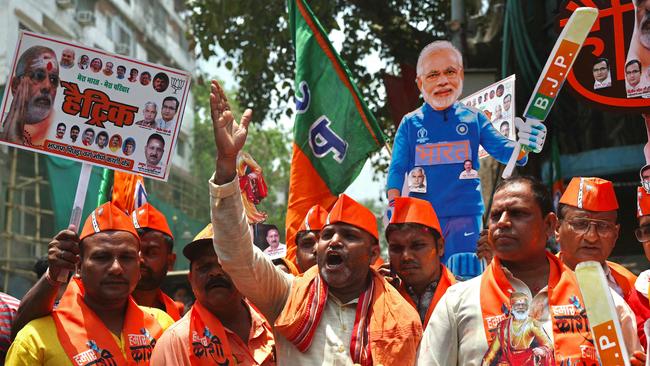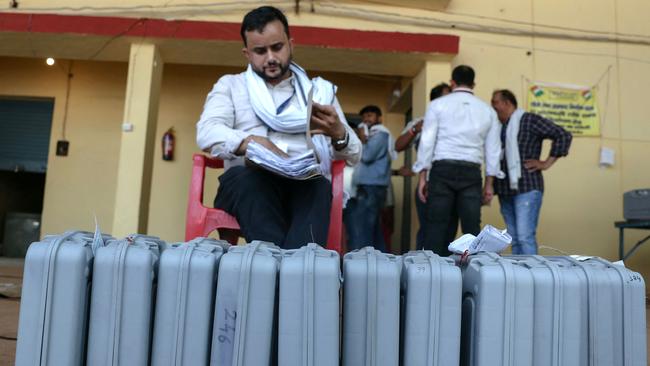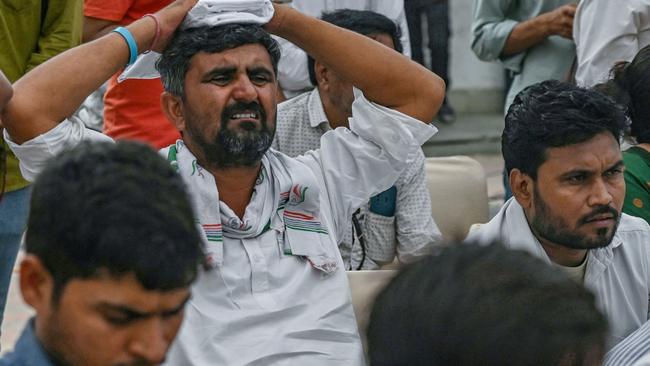
That’s the biggest news.
But almost equally big news is that his party, the BJP, and his coalition of parties, the National Democratic Alliance, have both gone backwards at this election.
The Congress party – which had been thought to be facing electoral wipe out – might go close to doubling the 52 seats it won in 2019.
There are 543 seats in India’s parliament, the Lok Sabha.
In 2019, the BJP won 303 seats, a majority in its own right. With its coalition partners, the NDA had 353 seats.
At the time of writing on Tuesday night, it looks as though NDA will have a majority but not the BJP itself. The NDA overall might have lost nearly 50 seats.
The opposition coalition, led by Congress, rejoices in the acronym of INDIA, which derives from the Indian National Development Inclusive Alliance, might have close to 80 additional seats.
These results demonstrate that India runs clean, honest elections.
The country deserves congratulations for the conduct of the world’s biggest election. Turnout was fractionally down on 2019, but still 642 million people voted in a peaceful, orderly election, held in seven phases during an exhaustingly hot summer.

Commentators who defame Modi as a dictator are talking nonsense. Dictators don’t go backwards in elections.
The BJP would like to be the automatic choice for the 80 per cent of Indians who are Hindu. It had hoped to gain 370 seats itself and more than 400 for the NDA, by expanding its influence in the south of the country.
That hasn’t worked. The BJP dominates the Hindi belt of northern states, but has not made deep inroads into southern states that are typically more developed and don’t have Hindi as their main language.
The BJP has also lost votes in its heartland northern states.
Nonetheless, no one should understate Modi’s enormous achievement. If he governs for a full term, he will be 15 years as leader of the world’s most populous nation.
Modi has given India new self-confidence and profile on the international stage. He has built strong infrastructure, encouraged business and this year has achieved an economic growth rate of 8-plus per cent.
India is the fastest growing big economy in the world. And while income inequality has grown, absolute poverty has declined.

The international investor class and Indian business like Modi. Exit polls, displaying the monumental inaccuracy that should always encourage scepticism, showed a huge landslide for Modi. When that didn’t come about, the stockmarket registered immediate decline.
Modi will still dominate Indian politics. But if the BJP doesn’t have a majority in its own right, then the inherent instability of coalition politics can arise, whereas Modi has projected a high degree of policy certainty in recent years.
Modi is 73, and if he runs for re-election next time he will be 78. As Joe Biden, Donald Trump, Xi Jinping, Vladimir Putin and others demonstrate, this is a fine time for old men. But if Modi’s health or energy start to falter, the deadly politics of succession will surely come into play.
The BJP is a venerable party which has supplied a number of prime ministers, in contrast to Congress, which always looks like a Gandhi family business. But it’s hard to imagine the BJP without Modi.
Modi is religious, a bachelor, childless – he won’t found a dynasty – and steeped in Hindu custom and Hindutva ideology, omnipresent in India. Yet he rarely gives interviews and is surrounded by a mystique of otherness and elevation.
Will this election result, and his advancing age, bring him back to earth? Indian foreign policy will likely remain unchanged, and that’s good for Australia and for Western nations seeking, among other things, a balance to China.
The prestige of democracy in the global south probably depends more now on India than the US.
India is not a formal ally of the West, of the US or Australia. But it’s the natural Asian balance to China. We have a huge stake in its success.
This election result, confirming continuity but also confirming democracy, may be the best result.




The genius and unpredictability of democracy, specifically Indian democracy, has again asserted itself. Narendra Modi, India’s dominant Prime Minister, has won re-election and will embark on a third five-year term.